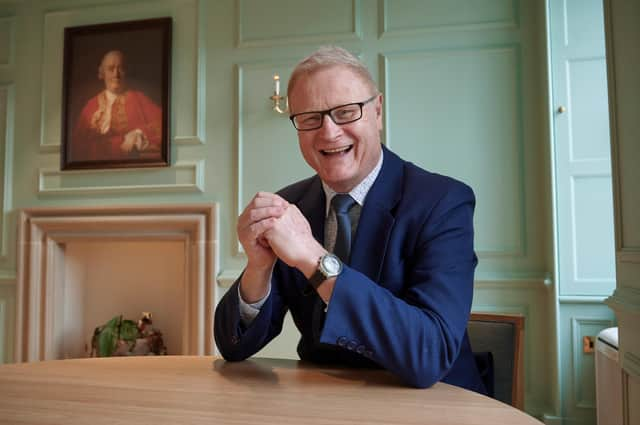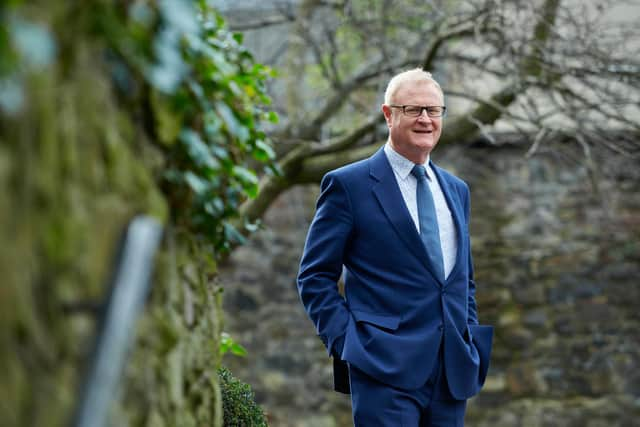The Big Interview: Scottish National Investment Bank chair Willie Watt


Financial services veteran Willie Watt was announced in November as the first chair of the Scottish National Investment Bank (SNIB), which describes itself as a mission-based development bank that will use debt and equity to finance businesses and projects that support Scotland’s ambitious sustainable economic growth strategy.
It says it will take an “innovative” approach, aiming to focus on key societal challenges including the transition to net-zero carbon emissions, “where SNIB can act as a catalyst to create a fairer, more inclusive, and ultimately more competitive and sustainable economy for Scotland”.
Advertisement
Hide AdAdvertisement
Hide AdWatt started his career at private equity group 3i, before moving to asset-manager Martin Currie – spending almost two decades at both. He is also a member of the advisory board of venture capital and growth equity firm Scottish Equity Partners, and is on National Galleries of Scotland’s board of trustees.


SNIB is set to launch this year. You said recently that “as we emerge from the Covid-19 pandemic, we will be operating in a very different economic landscape”. What impact will this have on the launch and the bank’s subsequent work?
Trying to launch SNIB within the context of Covid-19 is clearly a greater challenge than it would be in normal times. We still believe we can launch in 2020 as planned and are working hard to make sure that we do. SNIB isn’t intended to be a short-term lender in rescue situations, but we will be an important element in financing the recovery from what could be a deep economic downturn.
Our role will be to complement private sector lenders and investors, strengthening the range of financing options available to Scottish businesses and projects. Our focus will be on long-term finance.
I believe that SNIB’s missions will be even more relevant in a post-Covid environment. Our missions are still to be set by government, but we expect them to cover the transition to a net-zero carbon economy, promoting inclusive growth by investing in places, and supporting innovation to respond to emerging demographic pressures such as our ageing population.
Indeed, the pandemic has in some ways demonstrated what a lower-carbon Scotland might look like with less pollution and a healthier environment. On the negative side, both public and private budgets will be tight and there is a risk that viable “green” projects will suffer because of this. The post-Covid world will present challenges but also many opportunities to accelerate the transition to a net-zero carbon position.
Many commentators believe that disadvantage will increase as a result of the pandemic. That will make a mission focused on investing in places even more important. The resilience of knowledge-based companies and sectors during the crisis also underpins their importance for our recovery.
Your appointment as chairman of the SNIB was announced in November. Why did you decide to take on the role and what did you aim to achieve?
Advertisement
Hide AdAdvertisement
Hide AdI’ve always believed in the potential of Scotland’s businesses and its economy to better address the societal and economic challenges that it faces. I’m convinced that there’s an important role for a strategic investment organisation like SNIB to help address the releasing of this potential.
My experience working in the investment industry for 35 years has given me a good understanding of small and medium-sized enterprise (SME) investment, infrastructure and the importance of sustainability and environmental, social and governance factors. This combination of local knowledge coupled with a global perspective meant I felt that I could make a contribution as chairman.
You studied geography at university – how did you make the move into business?
I’ve always been interested in business and applied for a graduate scheme at 3i. I was and remain fascinated by what makes companies different from each other and how these factors contribute to their success.
What led you from 3i to Martin Currie?
I worked as an investor for 16 years, latterly running investment teams covering technology and energy as well as mid-market SMEs. During that time, I developed a real respect for the people that ran businesses and I wanted to transition from being an investor to being a CEO. I was given that opportunity to lead Martin Currie.
The bank aims to help Scotland’s journey towards net-zero carbon emissions, and support small and medium-sized enterprises. How do you personally and SNIB aim to help achieve this?
SNIB will focus closely on its missions – investing in places, responding to demographic pressures, and helping Scotland to meet its net-zero targets. The Scottish Government has been consulting widely on these missions so we know there is a lot of support for them. The Scottish Parliament will be consulted later in the year and Scottish ministers will finalise the missions after that.
We’ll seek out companies and projects we believe will contribute to the achievement of each mission – some will have positive impacts across more than one. A range of lending and investment instruments will be used to create patient capital solutions that allow companies and the projects that they commission to be well-financed, maximising their chances of success. Patient capital focuses on longer-term financing for multi-year projects that can be more challenging for private sector lenders.
Advertisement
Hide AdAdvertisement
Hide AdAs well as commercial returns, SNIB will also expect environmental and societal returns. Through these impacts we will achieve progress against our missions. As chairman my role is to lead the governance of SNIB, chair its board and, most importantly, to support Eilidh Mactaggart, our CEO, and her team to achieve these objectives.
A recent report from Edinburgh’s Ethical Finance Hub stated that Scotland can lead the way in responsible investment following the coronavirus crisis, and it is already “punching above its weight” in this area. Do you agree?
The EFH report is a useful piece of work and it summarises the commitment of Scotland’s investment management industry and its investment asset owners to sustainability. Some of our investment firms are leaders in this field and there is much that we in SNIB can learn from our listed investment colleagues.
Some comparisons have been made between the Green Investment Bank and SNIB – do you see any parallels?
Both are founded as state-sponsored, independent investment institutions, and have a focus on a green investment agenda but, of course, our progress and context are different. We will be an entirely independent organisation. I am sure we can learn from the Green Investment Bank and other organisations, for example the British Business Bank.
It is not our job to compete with private sector banks and investment organisations. We seek to work alongside them in situations where there is a shortage of investment capital and where our support might encourage the private sector to invest alongside us. Equally SNIB will play an important role in coordinating the various public sector investment sources that are currently available to make the most of their strengths and knowledge.
There was controversy over your appointment, related to Martin Currie being fined £8.6 million in the UK and America over a conflict of interests scandal. What is your view on this?
This issue related to an isolated conflict of interest situation that wasn’t managed as well as it could have been. As soon as we became aware of it, we reported the issue to the regulator, fully compensated the client for any loss, and restructured our compliance and governance functions to ensure that nothing similar could happen again. We also bolstered our executive and board, bringing in an ex-senior manager from the Financial Services Authority to join our board.
Advertisement
Hide AdAdvertisement
Hide AdWe made a mistake, we learned from the experience, and the business was stronger afterwards. Personally, that learning has made me a better manager and leader, and underscored my commitment always to do the right things for clients.
Establishing SNIB was announced in September 2017 – if we look five years ahead of this – to 2022, what would you like the bank to look like then?
Over the next two years from launch we want to earn the respect of the business community and wider civil society in Scotland. We want to build a vibrant organisation that will have made a range of successful investments that meet the focus of its missions across different sectors and geography.
A message from the Editor:
Thank you for reading this story on our website. While I have your attention, I also have an important request to make of you.With the coronavirus lockdown having a major impact on many of our advertisers - and consequently the revenue we receive - we are more reliant than ever on you taking out a digital subscription.Subscribe to scotsman.com and enjoy unlimited access to Scottish news and information online and on our app. With a digital subscription, you can read more than five articles, see fewer ads, enjoy faster load times, and get access to exclusive newsletters and content. Visit www.scotsman.com/subscriptions now to sign up.
Our journalism costs money and we rely on advertising, print and digital revenues to help to support them. By supporting us, we are able to support you in providing trusted, fact-checked content for this website.
Joy Yates
Editorial Director
Comments
Want to join the conversation? Please or to comment on this article.